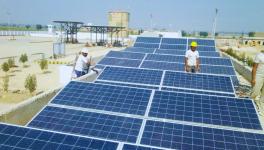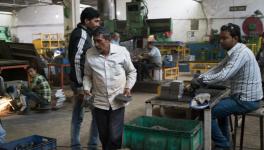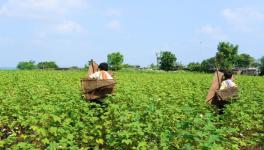Kerala Budget Focuses on Challenges of Rapid Urbanisation
Image Courtesy: PTI
The Budget of Kerala’s Left Democratic Front (LDF) government has taken cognisance of challenges posed by the unprecedented pace of urbanisation in the form of utilisation of available spaces, climate change, and equitable growth and infrastructure.
The state’s urban population increased to 47.72%, as per the 2011 Census, from 25.96% in 2001 with a decadal growth rate of 82.23%. The Nation Commission on Population has estimated that Kerala’s urban population will touch 96% in 2036.
The cities of Malappuram, Kozhikode and Kollam found a place in the top 10 list of fast-growing urban cities in the world.
The state government had enacted the Kerala Town and Country Planning Act, 2016, to tackle the challenges of urbanisation but its pace demands more scientific and urgent intervention.
Therefore, the Budget allocated Rs 100 crore for the initial work and earmarked Rs 1,055 crore for urban development programmes.
FASTER URBANISATION
Kerala’s demographic transition has fuelled rapid urbanisation in the recent decades. The State Urbanisation Report (SUR) prepared after the 2011 Census identified peculiarities in urbanisation and settlement patterns.
The SUR identified that urbanisation of Kerala is an urban spread rather than the result of structural changes in its economy. The report also found that the low population growth and increasing population density would lead to a scarcity of labour, which is true considering the higher number of migrant workers.
An urban planning expert requesting anonymity told Newsclick that urbanisation and industrial investment are “clustered around smaller pockets”.
Being a coastal state with restricted space, the government faces the challenge of ensuring the effective utilisation of space and facilities for all sections of society.
“Kerala is changing from rural to urban in social relationship, values, lifestyle use and consumption of technology and other key elements. Ethnically, the state is evolving as a multicultural state,” he said.
‘LOSS OF SPACE FOR PUBLIC USE’
The space for public utility, including parks and playgrounds, are reducing due to urbanisation. Meanwhile, the population above the age of 60 is 12.6%, as per the 2011 Census, against the national average of 8%. As per State Planning Board estimates, the population of the elderly would reach 20.9% in 2031.
“People across all age groups rely more on vehicle transportation, leading to an increase in lifestyle diseases in the state. People also suffer from mental health issues due to the urban-centric lifestyle. Such things need attention in urban planning,” the expert added.
The available public spaces give way for shopping complexes and other commercial buildings in the name of development. The aspirations of the middle class to enjoy the recent technological developments also play a role in increasing urbanisation.
“Private wealth is deployed to collect private comfort. Though this is not a fault, it is not sustainable. This is an issue of behavioural change,” he added.
The LDF government held a two-day National Urban Conclave-Bodhi 2022 last October to deliberate the challenges and opportunities of urbanisation. The discussions included adoption of new trends in urban design.
ADDITIONAL CHALLENGE OF CLIMATE CHANGE
Unprecedented floods in the last few years have caused massive loss of infrastructure, including roads and bridges, and damaged the agricultural sector. Several cities, including Kochi, are prone to inundation as they are were not planned to counter such extreme weather events.
Considering the recent problems, the Budget announced master plans for Thiruvananthapuram, Kochi and Kozhikode.
“With more built-up spaces in areas, including peri-urban locations, the threat of flash floods is increasing. People adapting to new lifestyles also contribute to emission of more greenhouse gases, escalating the problems,” the expert said.
These elements are affecting different sectors, including agriculture, housing, land utilisation, health policy and forest. Urban planning experts have called for a collaborative approach of policies in industry, water management and climate change.
The Rebuild Kerala Initiative, formed after the two consecutive floods, had proposed ‘Collective Thinking and Shared Purpose’, which remains relevant for urban policy too.
“Local and state governments, aided by people’s participation, remain the key for sustained urban development,” the expert said.
Get the latest reports & analysis with people's perspective on Protests, movements & deep analytical videos, discussions of the current affairs in your Telegram app. Subscribe to NewsClick's Telegram channel & get Real-Time updates on stories, as they get published on our website.
























